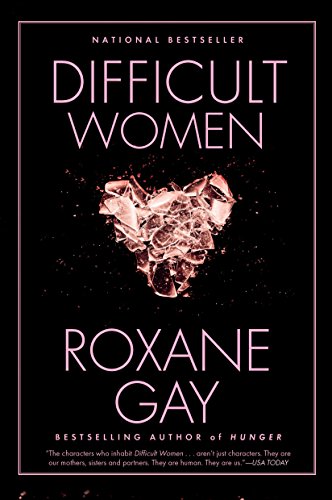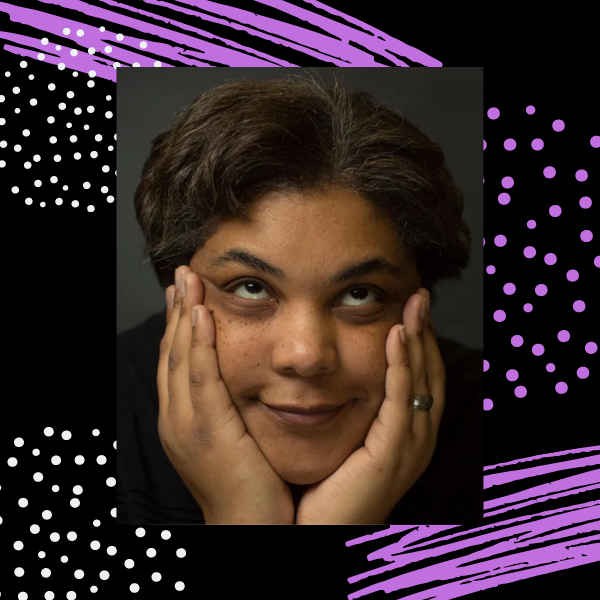A feminist, scholar, and writer (who really needs no introduction), Roxane Gay is a leading voice in contemporary feminist thought. She is intelligent and hilarious, something I know for a fact because she joined Feminist Book Club for a discussion of her book Difficult Women on January 28th. As you can imagine, members had a lot of questions for Roxane, so many that we ran out of time before getting to them all. She graciously answered many of our questions, and spoke on everything from an excellent pink cupcake recipe to supporting marginalized authors to what she thinks feminists must be working on at this moment.
Keep reading for some highlights from the multiple themes in our discussion.
On our January book, Difficult Women:
FBC Founder Renee: How do you think Difficult Women fits into the theme of courage?
Roxane Gay: You know, I think it takes courage to be difficult. Because, especially as women, we’re often told that we should shut up and look pretty, and that we should be happy with whatever we get and that we should tolerate truly atrocious behavior because that’s just the way it is. And I think that most of the women in these stories, they’re not actually difficult. They’re simply difficult because they have feelings and they dare to express them or act on them, and I do think it takes courage to do that.
Tayler: The story Noble Things has always stood out to me since I read it last year. I was so taken with the ideas of border separation and the thought of Americans as refugees at the time. It’s eerie to see these concepts remain so relevant, especially in the shadow of the Capitol storming. What inspired you to write this piece and would you make any changes based on your experiences with current events?
RG: I would not make any changes. I am surprised by how prescient the story actually was. When I wrote the story, I had been looking at voting maps and I looked at a comparison of voting maps from I think 1865… and voting maps from 2016, or somewhere around there, maybe earlier than 2016, like 2014 or 2012. The voting patterns were remarkably similar, and I thought, well if it happened once, it definitely could happen again, especially given the way things are going in the world. And so, I was just thinking through what would it look like if there was a second civil war? Who would be involved? The details of the war I’m not so interested in because war is war and it’s terrible and no one ever wins in a war. And so, what are the material effects of it on everyday people? That was the story I was very interested in telling. I would tell the same story today.

Elysse: Which of your stories from Difficult Women was your favorite to write and why?
RG: My favorite is North Country. I’m very fond of all of the stories in one way or another but North Country I have a very special place in my heart for.
Nancy: What I noticed right away about your stories was the racial ambiguity of your characters. I feel like most authors, white or Black, make it a point to make the race of characters known in some way. But some of your stories reminded me of a short story by Toni Morrison called Recitatif. I was wondering if this was intentional, or just how you felt like writing the stories?
RG: It is intentional but I would say that it’s not ambiguous. It’s to challenge your assumption that they’re white because people see whiteness as the default. Most of the characters are Black, and so it’s not ambiguous at all. It’s that you— not you, but the general you— assume that they must be white if I don’t specify otherwise. The only story I think where race is specified is La Negra Blanca and that’s because it’s for a specific reason because that story is (in my own way) a retelling of Nella Larsen’s Passing. And so, race figures into the story. And of course in Florida, race figures into the story as well, so you mention it. But where it’s not mentioned, the characters are Black because that is my default.
Yasi: Were any of the short stories really difficult or made you emotional when you were writing them since they’re about pretty powerful topics?
RG: Certainly some of the short stories were more challenging than others, but in general, especially in fiction, I don’t write about things until I’m in a place where I can without traumatizing myself. They were all difficult in one way or another— ha ha— but they weren’t so difficult that I harmed myself in the writing of the stories.
On writing:
Amanda: Do you use fiction writing to process things in a similar way to your essays? Is one more cathartic to write than another?
RG: It just depends. When I was much younger, all writing was cathartic. The older I get, and the more skilled I get, I hope, as a writer, the less it’s about catharsis and more it is about telling a given story or writing through an issue that concerns me and that I want to think about. So, it really just depends. But in the end, there tends to be catharsis in all kinds of writing, and it’s not my intention, it’s just a pleasant, and sometimes not-so-pleasant side effect of the work.
Kelly: Has writing comics changed the way you write other genres? Do you find it any more challenging given what tends to be a little bit different of an audience that might be reading your other works?
RG: That part is not a challenge because I’m not thinking about audience at all, I’m just minding my business. With comics, what was challenging was thinking more visually about the story and that’s definitely what I’ve taken forward into my work now, especially my fiction— trying to make it more cinematic, and thinking more about scene and the specifics of a given scene in a story. What would it look like? Where are people gonna be oriented and why? Because in comics you have to think about that, and you can’t assume, from one panel to the next, how they’re gonna get there. You have to lead the reader in a way that makes sense.
On feminism:
Rashmila: how do we negotiate the abuse of patriarchy on women and people who identify as women, and what can we do to help?
RG: I’m writing a piece right now called “The Limits of Feminism.” We’re starting to see that there are some real profound limits to feminism that we need to address because women are leaving the workplace right now in truly alarming numbers because of child care, and so really nothing has changed in 50 years. We wanna say it’s so much better, but it isn’t so much better when CEOs are stepping back so their stay-at-home husbands can have fucking help at home. That’s a true story. It’s just fucking incredible. I just keep thinking that we keep dicking around defining “what is feminism” and we don’t spend enough time thinking about policy and sustainable policies that will actually support women and allow them to enter the workplace and stay in the workplace. I think we have kind of failed at the feminist project and so we need to fucking regroup and we need to address the current limits of feminism as it stands and recognize that choice feminism does not work and we have to do something. I am just appalled. To this day, we keep having women as firsts. Janet Yellen is the first treasury secretary, this woman is the first NFL coach, like it’s 2021, how are these firsts happening now? And some of the firsts are real basic. Like, the first woman to drink water. We just need to figure it out. I think one of the key things we can do to combat the patriarchy is to just acknowledge that we need to have a more rigorous feminism to move forward, and that we can be as feminist as we want, but until the systemic issues are addressed, things aren’t going to change. Our infrastructure is designed to cater to men. Just today I read an article about a New York Times reporter, a high-profile one, who used the n word and other racial slurs multiple times, and was reprimanded, while that woman Lauren Wolfe was fired because she had chills because democracy functioned for once, when Joe Biden’s plane landed in DC for the peaceful transition of power (which was not actually that peaceful). We see these double standards every single day. There are absolutely no consequences for men, ever [. . .] And you know, we have no framework for dealing with these things because there’s always someone there to justify a man’s bullshit. We have to call these things out and then not worry about how we’re gonna be framed because unfortunately, when you call these kinds of things out, you are framed as humorless. And as strident. You know what? Fine. Yes, I am humorless about the subjection of women. I am. So, what’s next?
Roxane’s next book, How to Be Heard, releases November 16th and will be available for pre-order soon. You can find more from Roxane and her current projects here.
February’s book pick is The Body is Not an Apology, and author Sonya Renee Taylor will be taking our questions. Consider joining us!


